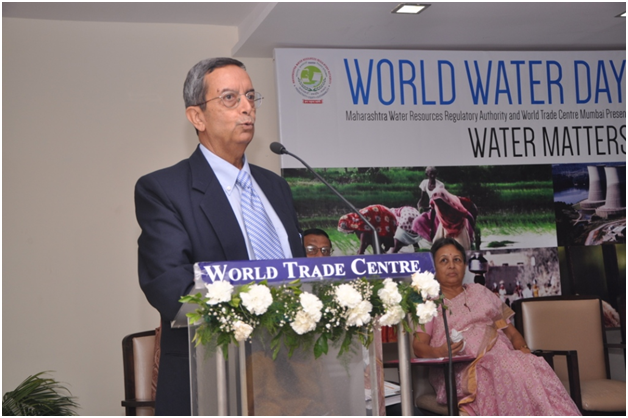“Water should be given the importance it deserves. Water tariff should cover both capital costs as well as maintenance charges as against the present rate which covers only the later. In order to promote optimal use of water, municipal bodies should price water on the basis of a slab system. Demand for water can be reduced by around 30 per cent if it is recycled and used for flushing and gardening”, said Ravi B. Budhiraja, Chairman, Maharashtra Water Resources Regulatory Authority while delivering the theme address at a panel discussion on ‘Water Matters’ jointly organized on 20th March 2015 by MVIRDC World Trade Center and Maharashtra Water Resources Regulatory Authority ahead of World Water Day.
Noting that 54% of India face extremely high water stress owing to unsustainable growth of urbanization, contamination of fresh water bodies, sub-optimal irrigation practices, Budhiraja said the government and the civil society employ take proper demand and supply management tools to contain the crisis. India is seriously lacking in demand management tools to ensure efficient use of water. These tools include introduction of modern metering systems in every household, appropriate pricing of water to discourage its wastage, auditing industrial water usage, promoting drip irrigation and introducing efficient canalling for irrigation. Among supply management tools, he pointed out measures like ground water harvesting, deepening of rivers, increasing the number of water storage facilities, ensuring treatment of effluent waters before it is discharged in rivers etc.
Pradeep Purandare, Retired Associate Professor, Water and Land Management Institute, Aurangabad stressed on the need to introduce cutting-edge irrigation technologies to ensure efficient usage of water in agriculture.

Specifically, he opined that the government must migrate from the old irrigation system of open channel, which is very difficult to control and regulate, to participatory irrigation system, which is flexible in management. The modern irrigation system proposed by him must have features like arrangements for volumetric supply, duckbill weirs, better water level and discharge controls, among other things.
Ramakant Pandit Rao, Superintending Engineer, Maharashtra Industrial Development Corporation (MIDC) elaborated the water supply management of the corporation. He said the corporation is encouraging the setting up of sewerage treatment plants in order to ensure that waste water is recycled for non-drinking usage.
S.S. Chaudhari, Chief Engineer, City and Industrial Development Corporation of Maharashtra (CIDCO) observed that despite planned water supply system in the Navi Mumbai areas, demand for water (215 MLD) exceeds supply (190 MLD) due to rapid rise in the population in a short span.
Speaking about the measures to control demand for water, he said the CIDCO’s initiative to install water meters in individual tenements revealed significant wastage of water by households. Therefore, he called for efficient pricing mechanism to discourage wastage of water.
He also pointed out the CIDCO’s move to introduce recycling of water using SBR technology. He said CIDCO has contained the loss of water in transmission to 2%, and is taking steps to arrest loss in distribution (which stands at 30-34%).
Suresh V Sodal, Member, Water Resources Engineering, Maharashtra Water Resources Regulatory Authority talked about the impact of climate change on water availability for future generation and the importance of urban and rural development planning in this context.
Speaking on policy measures to address the challenges of climate change, Sodal recommended that the planning authorities must design hydraulic structures that can accommodate heavy rainfall in short time period, encourage cropping pattern that is best suited for the unpredictable climate pattern etc.
He also delved into the debate on the suitability of large hydraulic structures versus small ones. While agreeing that there are pros and cons with both these methods of conserving water, he said the planning authority must choose the right one based on need.
Earlier in her welcome address, Rupa Naik, Director-Projects, MVIRDC World Trade Center said individual organizations and households must take steps on a daily basis to conserve water. These steps, along with the government measures, may go a long way in reducing wastage of this precious resource, Naik said.
Khyati Naravane, Assistant Director-Trade Promotion proposed the vote of thanks.

 : +91 7718886506
: +91 7718886506